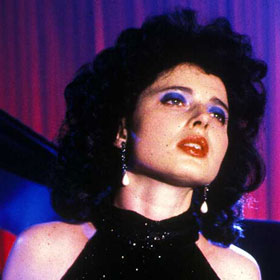Blue Velvet Blu-ray

4/5
The term auteur – the idea that films retain the personal sensibilities of their directors, like fingerprints – is thrown around quite frequently in this field. This theory, while extremely popular, has many critics, most of which argue that film is such a collaborative medium that no one person can be singled out to such a degree (writers oppose the auteur theory vehemently). Still, in certain cases it is hard to argue against the theory of directorial ownership and David Lynch is perhaps the hardest of all cases to argue against. After the directorial boom of the seventies had well and truly bust (to be fair, reckless self-indulgence on the part of filmmakers left more than a few studios bankrupt), the crass, empty commercialization that came to define `80's moviemaking left audiences yearning for something more personal – something with a little meaning behind it – and Lynch gave them exactly what they were looking for.
Lynch's background in traditional art – its forms and its presentation – had a profound impact on his work as a filmmaker. Images that have now become so instantly recognizable as to be labeled “Lynchian” frequently resemble that of a traditional painted picture. A reclusive eccentric, the man has become renowned for his surrealist sequences, propelled forward through a hazy ambiance (or a downright nightmarish one depending on his mood) by ever-more perplexing dream logic. Though Lynch has a definite affection for Small Town, U.S.A, – the man himself a proud Eagle Scout from Missoula, Montana – he prefers to focus on its dark and seedy underbelly, seeking companionship with the deranged, the unbalanced, and the emotionally crippled.
Arguably serving as something of a dry run for both Twin Peaks and Mulholland Drive, Blue Velvet follows a young man named Jeffery Beaumnont (Kyle MacLaclan), and his descent into a surrealist suburban nightmare after finding a severed ear lying in the grass while walking home one day. Jeffery's wide eyed determination to uncover the mystery of the ear lead him to a woman named Dorothy Vallens (Isabella Rossellini). Dorothy's husband and son have been kidnapped by a violent sociopath named Frank (Dennis Hopper), who abuses Dorothy and forces her to engage in bizarre and sadistic sex acts with him.
Women who have been beaten and abused, and women who have or may have been the victims of incest are themes that Lynch has returned to throughout his work. It is present to some degree or another in Blue Velvet, Lost Highway, Wild At Heart, Twin Peaks and (Blue Velvet aside) most notably, Fire Walk With Me. Were Fire Walk With Me not a legitimate prequel to Twin Peaks, it could quite easily be re-titled as Blue Velvet – Part II, such are the striking similarities in subject matter, theme and artistic design. What comes across most stridently is the director doubling down on the premise of moral decay lurking just beneath the surface. In Blue Velvet it is only characters who stray down a dark path – onto the wrong side of the tracks, so the speak – that get hurt. Later-day Lynch offers the uncomfortable truth that so much abuse is perpetrated by those much, much closer to home.
Embraced by the majority of arthouse audiences as an instant cult classic, and the herald of a potential "new-wave" of independent that ultimately never came (at least not for another decade anyway), there were some more mainstream detractors. Roger Ebert in particular was a vocal critic, citing that such abuse without explanation was exploitative and just plain cruel. Yet that assessment, while not entirely inaccurate, somewhat misses the larger point. The Lynch protagonist shares the director's own belief that the mystery is never completely solvable and its players elusive and ultimately unknowable. Is there ever really a truly satisfying explanation for evil? Lynch doesn't think so and as such never cares to explain every strand of narrative or feel the need to tie them together, and neither do those he employs to solve them in his films.
While doggedly determined, the Lynch protagonist is prepared to accept that what is, is simply, what is. Lynch does not reveal all the pieces for he himself does not have them, preferring to work primarily on intuition without necessarily having a whole blueprint. To have all the pieces would change the way he feels and reacts, and so he rightly feels the same to be true for the viewer. While his work often confounds and confuses, the sum of their parts is total. All you see is all that Lynch sees, and it is to be seen as an incomplete whole. To this effect, as per his request, many of his DVD releases do not contain the option of chapter selection, which force them to be viewed in their entirety or not at all. Blue Velvet, like so much of the man's work, is less or a story and more of a journey. Lynch's vision is not easily accessible, and certainly not for everyone. But that only further proves that the vision is his and his alone.
Blu-ray Special Features:
Extras are largely carried over from the DVD release, including the commentary feature Mysteries of Love and some TV spots (Siskel and Ebert) from the time of release. The real treasure here though is the newly discovered footage, which help flesh out Blue Velvet to the point of epic. Before pouring his untapped reservoir into Twin Peaks, Lynch originally envisioned this picture as more than four hours in length. Imagine that?
RELATED ARTICLES
Get the most-revealing celebrity conversations with the uInterview podcast!







Leave a comment